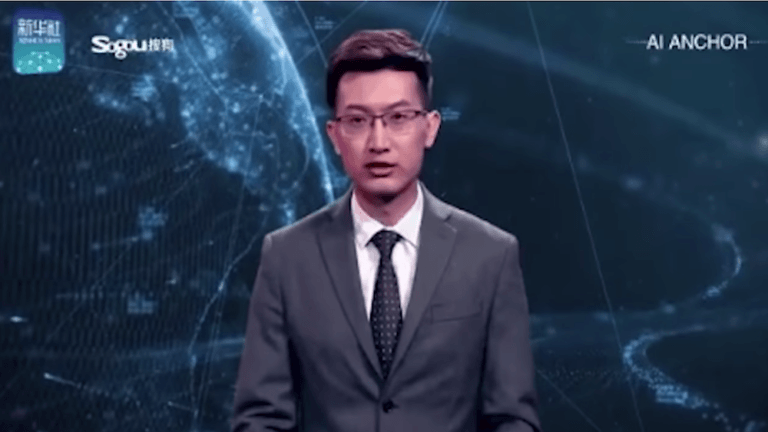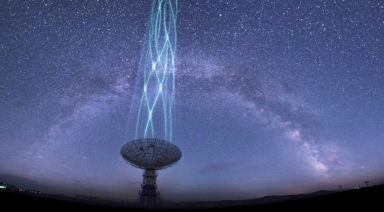Chinese State-Run TV Debuts Artificial Intelligence News Anchor

Chinese state-run news agency, Xinhua, broadcast its first A.I. news anchor modeled after one of its prime-time anchors, Zhang Zhao. The AI anchor was fashioned as the agency’s English-speaking host and promises it will report the news tirelessly, year-round, and without claiming overtime pay. Ha, ha, that’s a good one – apparently our future A.I. overlords have a sense of humor too.
The A.I. news anchor seems to employ similar technology to Apple’s Animoji, which mimics facial expressions, or it may be similar to a CGI character from your favorite superhero movie that looks uncannily realistic. According to one of its creators, Wang Xiaochuan, the technology could one day be used to have a digital mockup of anyone read the news to you, including your own parents.
But the concern with this technology for use in news media has stoked fears that it could be used to spread fake news and propaganda in a world rife with such issues. Videos implementing the technology to depict world leaders and celebrities giving completely fabricated speeches have circulated the internet recently, though it’s unclear whether these videos have been used to truly deceive anyone yet.
“Not only can I accompany you 24 hours a day, 365 days a year. I can be endlessly copied and present at different scenes to bring you the news,” the A.I. bot claims in the video.
In a world where traditional news media business models are failing due to new forms of consumption and widespread public distrust, this new technology promises to cut costs for publishers who no longer have to pay an actual human, while their bot can run non-stop as long as it has a script.
“The development of the media industry calls for continuous innovation and deep integration with the international advanced technologies … I look forward to bringing you brand new news experiences,” the bot said.
The pioneering of this technology by China is unsurprising as the autocratic country’s news reporting is entirely state-run. The country has taken other similarly Orwellian steps in its technological development, including a social credit score that rates its citizens’ daily behavior. The country has also installed a nearly universal surveillance apparatus that includes millions of CCTV cameras monitoring its citizens with machine-learning AI facial recognition technology.
The fears behind A.I. development stem from the idea that machine learning algorithms could one day lead to sentience and by the time this happens, A.I. will increase at an exponential rate, eventually realizing it doesn’t need humans or that it could enslave us due to a massive discrepancy in intellectual capacity. Others say this fear is absurd as we’ll always be able to unplug it – it’s just a computer after all. Right?
For more on the rise of artificial intelligence and the potential threats it poses, watch this episode of Deep Space :
Artificial Intelligence Finds Missing Ghost Ancestor of Humans

Our ancestry as a species is intricate and convoluted. We know that Denisovans, Neanderthals, and the other iterations of our hominin ancestors interbred and evolved over hundreds of thousands of years. But while anthropologists have done their best to map out this complicated lineage, we’ve now reached a point in our evolution that machines can map our genealogy better than we can. Such was the case when a machine learning algorithm applied to our DNA roadmap found a new ancestor we didn’t even know existed.
According to a study published in Nature Communications, scientists fed DNA data from fossilized bones and modern humans into an A.I. algorithm that computed thousands of timelines to map out the possible evolutionary pathways based on what we know – or what we think we know – about our ancestors migrations, diasporas, and interbreeding to tell us if we were missing anything.
It turns out we were…
The new study found that a missing, archaic “ghost” ancestor played a significant role in the development of the human species, helping to propel us from primitive hominins to the highly intelligent beings we are today.
This ancestor was likely a hybrid of Neanderthals and the Denisovans – the hominin ancestor discovered in 2010, that five percent of modern humans can still directly trace their genealogy through.
And though the study’s authors are referring to this hominin hybrid as a “ghost” population, they also believe there might be fossil evidence of it found in the bones of a 90,000-year-old specimen of a teenage girl discovered in Siberia’s Denisova cave – the location where the original Denisovan fossils were found.
The discovery of the Denisovans has presented itself as one of the most profound and baffling finds for archeologists within the past decade as their fossil remains showed they existed for millennia alongside our other ancestors. Not to mention they appear to have been massive in comparison to other hominin species.
And by massive, they mean that a Denisovan wisdom tooth found in the cave was originally mistaken for that of a bear’s. And though wisdom teeth can vary in size, the anthropologist studying the specimen, Bence Viola, told National Geographic, “large teeth with massive roots would probably require massive jaws.”
Who were these gigantic Denisovans whom we know so little about, and even more baffling, what did their hybrid progeny with Neanderthal’s look like? These paradigm-shifting discoveries only add to the fact that we still have so much more to learn about our species’ history.
For more on the strange discovery of the gigantic Denisovans check out this episode of Ancient Civilizations :



































